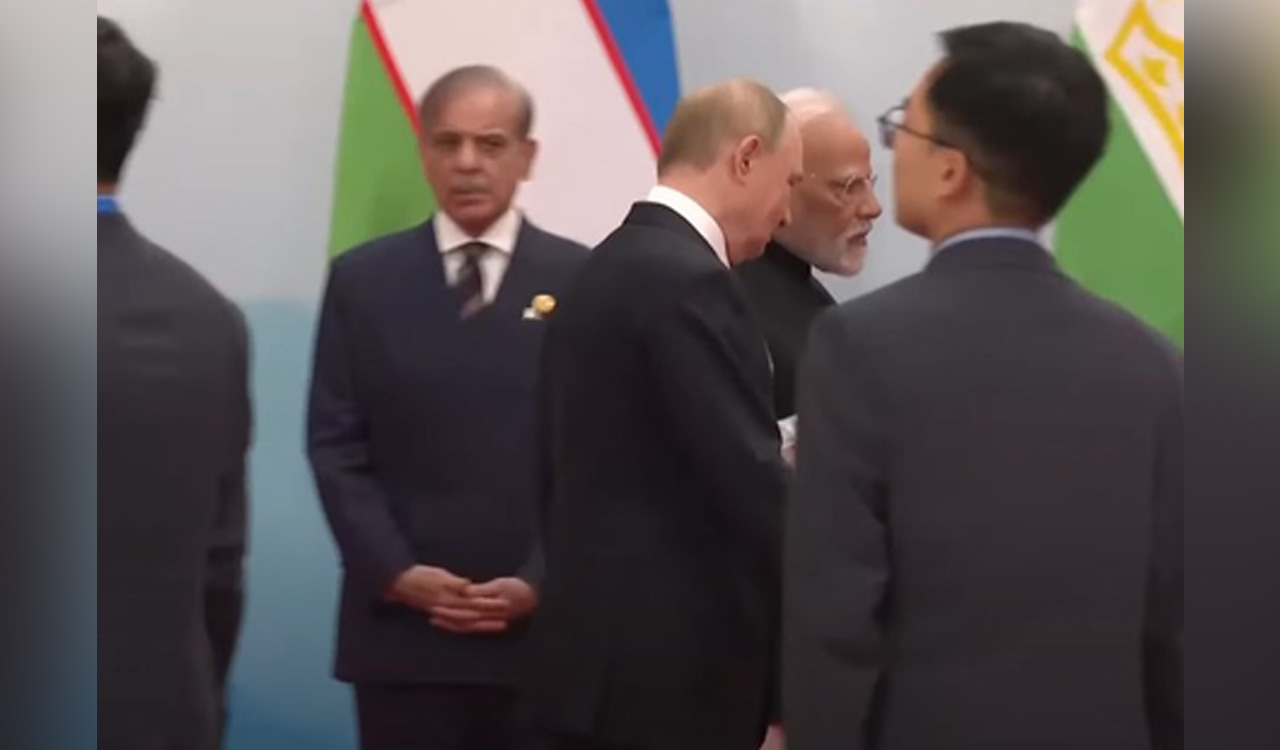World
Modi and Xi Unite Against Terrorism, Embarrassing Shehbaz Sharif

The ongoing Shanghai Cooperation Organisation (SCO) Summit in Tianjin, China, has put Pakistan’s Prime Minister Shehbaz Sharif in a difficult position as leaders from India and China emphasized the need for a united front against terrorism. Prime Minister Narendra Modi and President Xi Jinping made strong statements condemning terrorism, particularly cross-border threats, which highlighted Pakistan’s growing isolation on security matters.
During the summit, Modi condemned the recent Pahalgam attack that occurred on April 22, 2025, expressing solidarity with the victims and calling for collective action against terrorism. The declaration from the SCO member states, which called for bringing the perpetrators to justice, further underscored the negative implications for Pakistan, especially as Sharif was present during these crucial discussions.
In a significant moment, Modi highlighted the importance of not employing double standards in the fight against terrorism. He stated that both India and China have suffered greatly from terrorist activities and should collaborate to combat this global challenge. Foreign Secretary Vikram Misri noted that Modi’s address was direct and specific, urging China to support India in its ongoing battle against terrorism.
Sharif’s predicament was compounded by the strong condemnation of the Pahalgam attack from the SCO. The collective expression of sympathy for the victims and the firm stance against terrorism served as a pointed reminder of Pakistan’s contentious role in regional security issues.
“The Member States strongly condemned the terrorist attack in Pahalgam on 22 April 2025. They expressed their deepest sympathy and condolences to the families of the dead and the wounded,”
the summit declaration stated.
Additionally, Xi’s support for India in tackling cross-border terrorism was a notable shift, especially considering China’s investments in Pakistan. These projects have come under threat from groups such as the Tehreek-e-Taliban Pakistan (TTP), which have consistently targeted Chinese interests. This situation has led China to pressure Pakistan to manage these militant factions to ensure the safety of its personnel and investments.
The backdrop of these discussions includes Pakistan’s recent military operations, such as Operation Sindoor, intended to retaliate against the Pahalgam attack. Despite claims of success, Pakistan’s narrative appears increasingly strained in light of the SCO’s condemnation of terrorism and the insistence on accountability for those responsible for such attacks.
Modi’s remarks during the summit, where he noted that India has faced the brunt of terrorism for over four decades, resonate deeply given the context of the Pahalgam incident. The strong stance taken by the SCO and the presence of leaders like Turkey’s Recep Tayyip Erdogan, who has historically supported Pakistan, adds further pressure on Sharif’s administration.
As the summit progresses, the diplomatic dynamics surrounding these discussions continue to evolve, with implications not only for India and Pakistan but for the broader region’s security landscape. The collaboration between India and China against shared security threats serves as a clear signal of the shifting geopolitical landscape in Asia and poses challenges for Pakistan’s foreign policy strategy moving forward.
-

 World5 months ago
World5 months agoSBI Announces QIP Floor Price at ₹811.05 Per Share
-

 Lifestyle5 months ago
Lifestyle5 months agoCept Unveils ₹3.1 Crore Urban Mobility Plan for Sustainable Growth
-

 Science4 months ago
Science4 months agoNew Blood Group Discovered in South Indian Woman at Rotary Centre
-

 World5 months ago
World5 months agoTorrential Rains Cause Flash Flooding in New York and New Jersey
-

 Top Stories5 months ago
Top Stories5 months agoKonkani Cultural Organisation to Host Pearl Jubilee in Abu Dhabi
-

 Sports4 months ago
Sports4 months agoBroad Advocates for Bowling Change Ahead of Final Test Against India
-

 Science5 months ago
Science5 months agoNothing Headphone 1 Review: A Bold Contender in Audio Design
-

 Top Stories5 months ago
Top Stories5 months agoAir India Crash Investigation Highlights Boeing Fuel Switch Concerns
-

 Business5 months ago
Business5 months agoIndian Stock Market Rebounds: Sensex and Nifty Rise After Four-Day Decline
-

 Sports4 months ago
Sports4 months agoCristian Totti Retires at 19: Pressure of Fame Takes Toll
-

 Politics5 months ago
Politics5 months agoAbandoned Doberman Finds New Home After Journey to Prague
-

 Top Stories5 months ago
Top Stories5 months agoPatna Bank Manager Abhishek Varun Found Dead in Well









